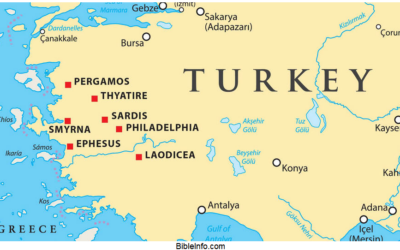Jeremiah 29:11 is often quoted and printed on images and materials as a source of inspiration and comfort. The verse reads:
“‘For I know the plans that I have for you,’ declares the Lord, ‘plans for welfare and not for calamity to give you a future and a hope,” (Jeremiah 29:11).
One can certainly see how people might find these words encouraging. Yet, more biblically astute readers are often quick to point out that such a shallow, feel-good usage of this verse entirely ignores the context and thus misses the point. This is quite true. Yet, after all is carefully read and the context fully considered, this passage (like all of Scripture) still does have meaning for Christians today, if not exactly the meaning that we initially thought.
The verse in Context
To understand this (or any) verse, it is important to consider the immediate context. The book of Jeremiah is primarily concerned with Judah’s sin and God’s intention to punish them by sending them into exile in Babylon. It is not a rosy book of happy promises, but a stern warning of what they deserve and what God will soon bring about. Indeed, some portions of the book were written after the process of exile had already begun. Thus, when we arrive at chapter 29, we read:
“Now these are the words of the letter which Jeremiah the prophet sent from Jerusalem to the rest of the elders of the exile, the priests, the prophets and all the people whom Nebuchadnezzar had taken into exile from Jerusalem to Babylon,” (Jeremiah 29:1).
God then proceeds to instruct them that their exile will not be brief. Unlike earlier times, such as in the days of the judges, God will not swiftly raise up a deliverer. They are going to be there a long time and need to live accordingly:
“Thus says the Lord of hosts, the God of Israel, to all the exiles whom I have sent into exile from Jerusalem to Babylon, ‘Build houses and live in them; and plant gardens and eat their produce. Take wives and become the fathers of sons and daughters, and take wives for your sons and give your daughters to husbands, that they may bear sons and daughters; and multiply there and do not decrease. Seek the welfare of the city where I have sent you into exile, and pray to the Lord on its behalf; for in its welfare you will have welfare,'” (Jeremiah 29:4-7).
Instead of hoping for the quick downfall of Babylon, they were to pray for Babylon’s prosperity. Why? Because, no matter what, they were going to have to live there. God was not letting them come home. If Babylon fell on hard times, the Jews would have to suffer through those hard times with them. The point is clear: God was sending them away for a long time. Yet, there seem to have been false prophets that were trying to tell the people otherwise, for we read:
“For thus says the Lord of hosts, the God of Israel, ‘Do not let your prophets who are in your midst and your diviners deceive you, and do not listen to the dreams which they dream. For they prophesy falsely to you in My name; I have not sent them,’ declares the Lord. For thus says the Lord, ‘When seventy years have been completed for Babylon, I will visit you and fulfill My good word to you, to bring you back to this place,'” (Jeremiah 29:8-10).
God gave them a specific time frame: seventy years. The implications of this were grim. All the adults (and many of the young children) who were taken into exile would grow old and die there without ever being able to come home. Any prophet who told them otherwise was a liar. God had pronounced His sentence. Yet, there is a word of hope here. Though few in the current generation would live to see it, their children and grandchildren would not be left in exile forever. God was punishing His people, but He was not abandoning them. The Jews would get to come home. It is in this context that God says:
“‘For I know the plans that I have for you,’ declares the Lord, ‘plans for welfare and not for calamity to give you a future and a hope. Then you will call upon Me and come and pray to Me, and I will listen to you. You will seek Me and find Me when you search for Me with all your heart. I will be found by you,’ declares the Lord, ‘and I will restore your fortunes and will gather you from all the nations and from all the places where I have driven you,’ declares the Lord, ‘and I will bring you back to the place from where I sent you into exile,’” (Jeremiah 29:11-14).
God’s ultimate goal in the exile was not to harm the nation of Judah. It was to bring them to repentance, turn them from their idols, and bring them back safely. God was punishing them harshly, but it was for their own good. God would deliver His people over to their enemies, but not forever. God’s plan to give Israel a hope and a future was a plan to cast them out into a brutal foreign land so that they would turn from their idols and call on His name; then He would finally bring them home.
The Meaning for Us Today
So, this promise is directly tied to God’s covenant with Israel and specifically related to the Babylonian exile. What, then, does this passage mean to us? It reveals the heart of God toward those with whom He has graciously bound Himself by a covenant and, though this verse is not directly a promise to us, it does, by way of example, demonstrate to us a great deal about how God keeps similar promises to His New Covenant people.
First of all, it is a stern but encouraging reminder that God uses the suffering of His people to turn our hearts back to Him and to bring about our good. In this regard, just as God has done with Old Covenant Israel, so too will He do for all who bound to Him in Christ, as we see in such passages as:
“For those whom the Lord loves He disciplines, And He scourges every son whom He receives. It is for discipline that you endure; God deals with you as with sons; for what son is there whom his father does not discipline? But if you are without discipline, of which all have become partakers, then you are illegitimate children and not sons,” (Hebrews 12:6-8).
“Consider it all joy, my brethren, when you encounter various trials, knowing that the testing of your faith produces endurance. And let endurance have its perfect result, so that you may be perfect and complete, lacking in nothing,” (James 1:2-4).
“And not only this, but we also exult in our tribulations, knowing that tribulation brings about perseverance; and perseverance, proven character; and proven character, hope; and hope does not disappoint, because the love of God has been poured out within our hearts through the Holy Spirit who was given to us,” (Romans 5:3-5).
“And we know that God causes all things to work together for good to those who love God, to those who are called according to His purpose,” (Romans 8:28).
God cast Israel into exile, but not to destroy them. Rather, He did so to chastise and restore them. God likewise chastises us. He also allows us to suffer this side of eternity so that we grow in faith and character, learning to rely on Him in all things. Judah’s suffering was not without purpose and neither is Christian suffering today.
Further, Judah had a promise that, after a time of exile, they would be brought home. We, too, have a parallel promise. We live as strangers and exiles in this world from now until death or until our Lord’s return, but after that, we too will be brought to our promised home in a heavenly country and life without end! As Jesus said:
“Do not let your heart be troubled; believe in God, believe also in Me. In My Father’s house are many dwelling places; if it were not so, I would have told you; for I go to prepare a place for you. If I go and prepare a place for you, I will come again and receive you to Myself, that where I am, there you may be also,” (John 14:1-3).
God kept His promise to Judah. They returned home after seventy years, just as Jeremiah predicted (see Ezra 1:1). Thus, Jeremiah 29 and its fulfillment serve to remind us that God will likewise keep His promise to us now. We can live as aliens and sojourners in this life, suffering rejection and even persecution if necessary, knowing that God will ultimately raise us up to eternal life in His kingdom to come! He has a plan for our good. It does not necessarily mean that we will have any material comfort or privilege in this life. It does mean, however, that in the age to come it will be more than worth the wait.
“For I consider that the sufferings of this present time are not worthy to be compared with the glory that is to be revealed to us. For the anxious longing of the creation waits eagerly for the revealing of the sons of God,” (Romans 8:18-19).






